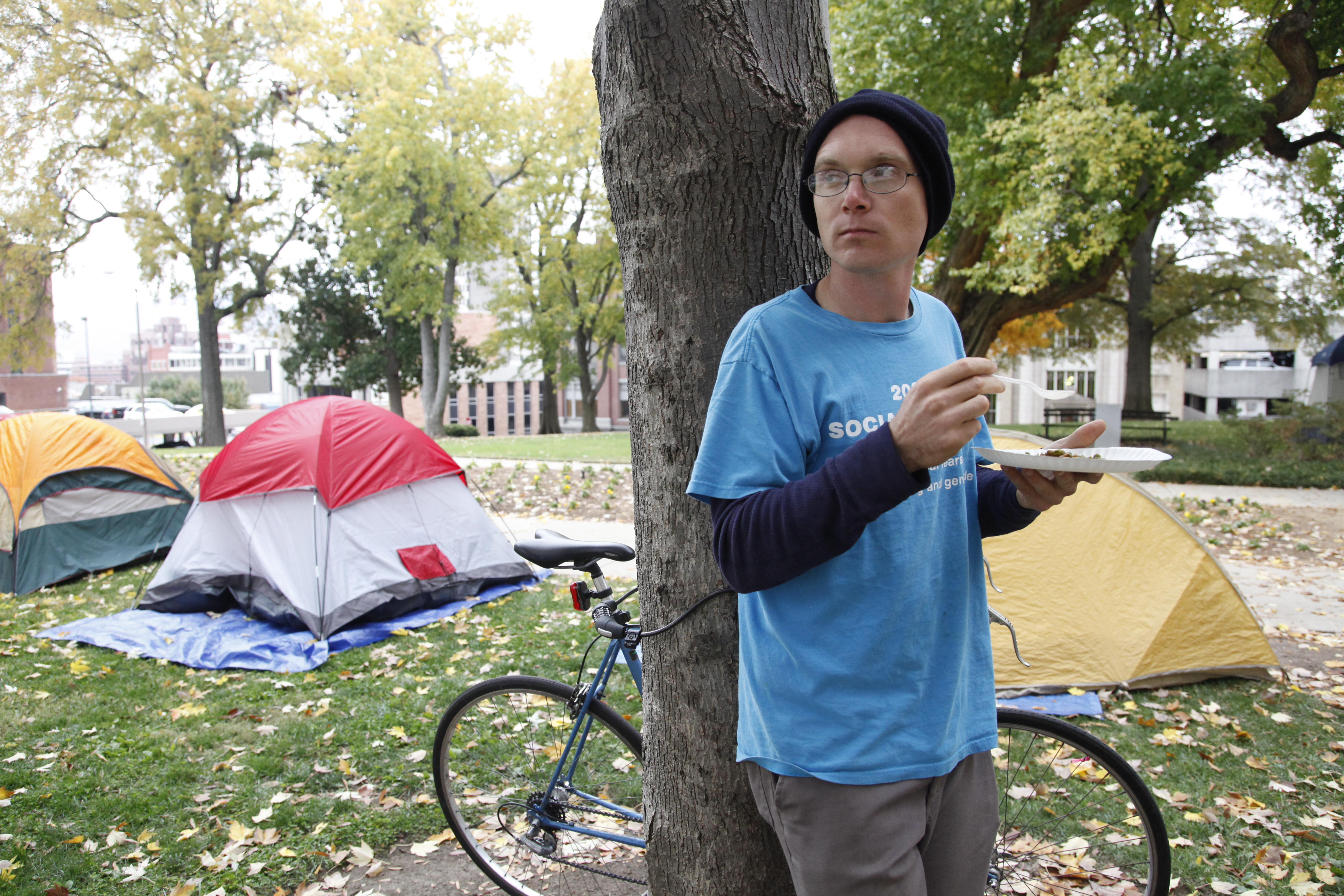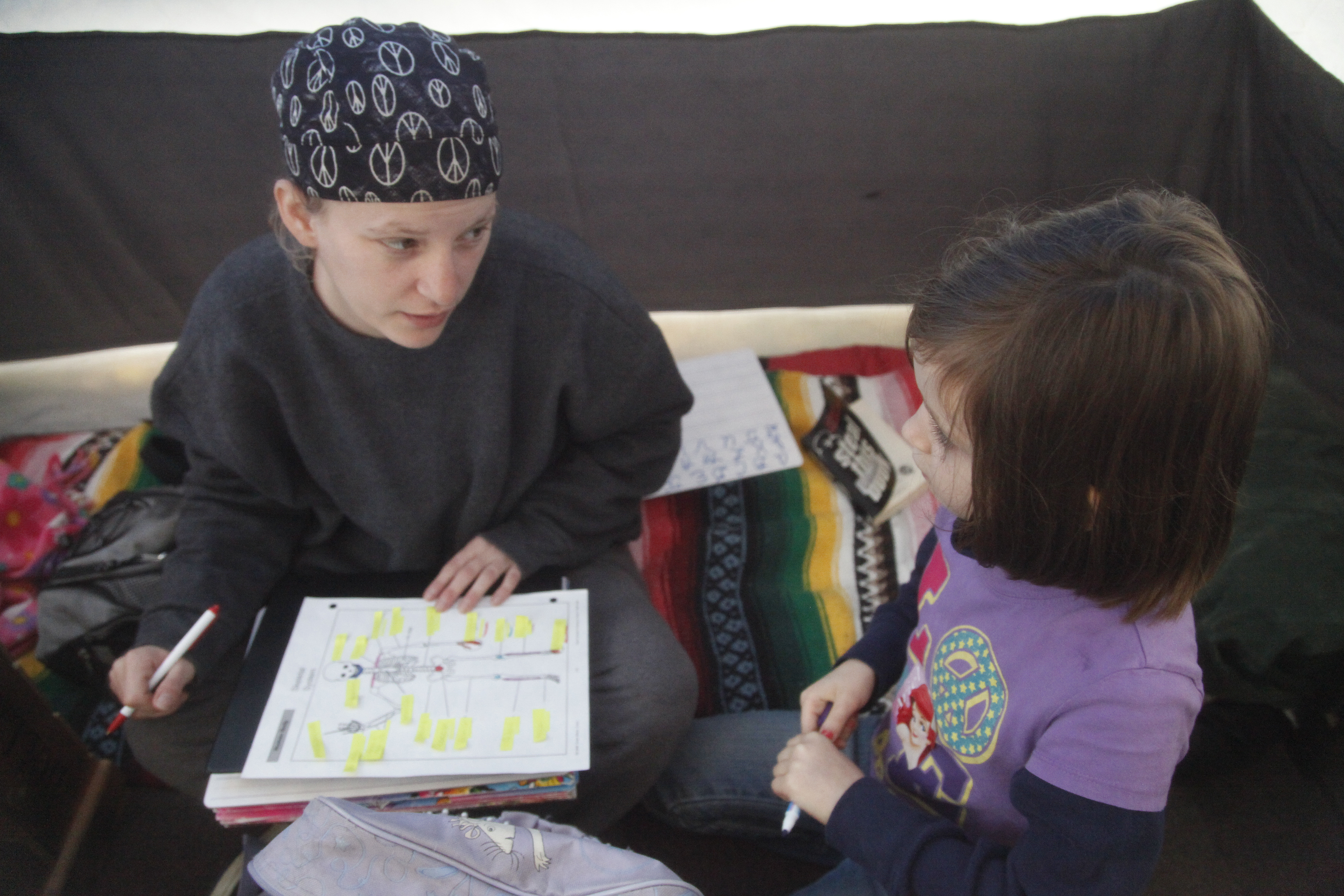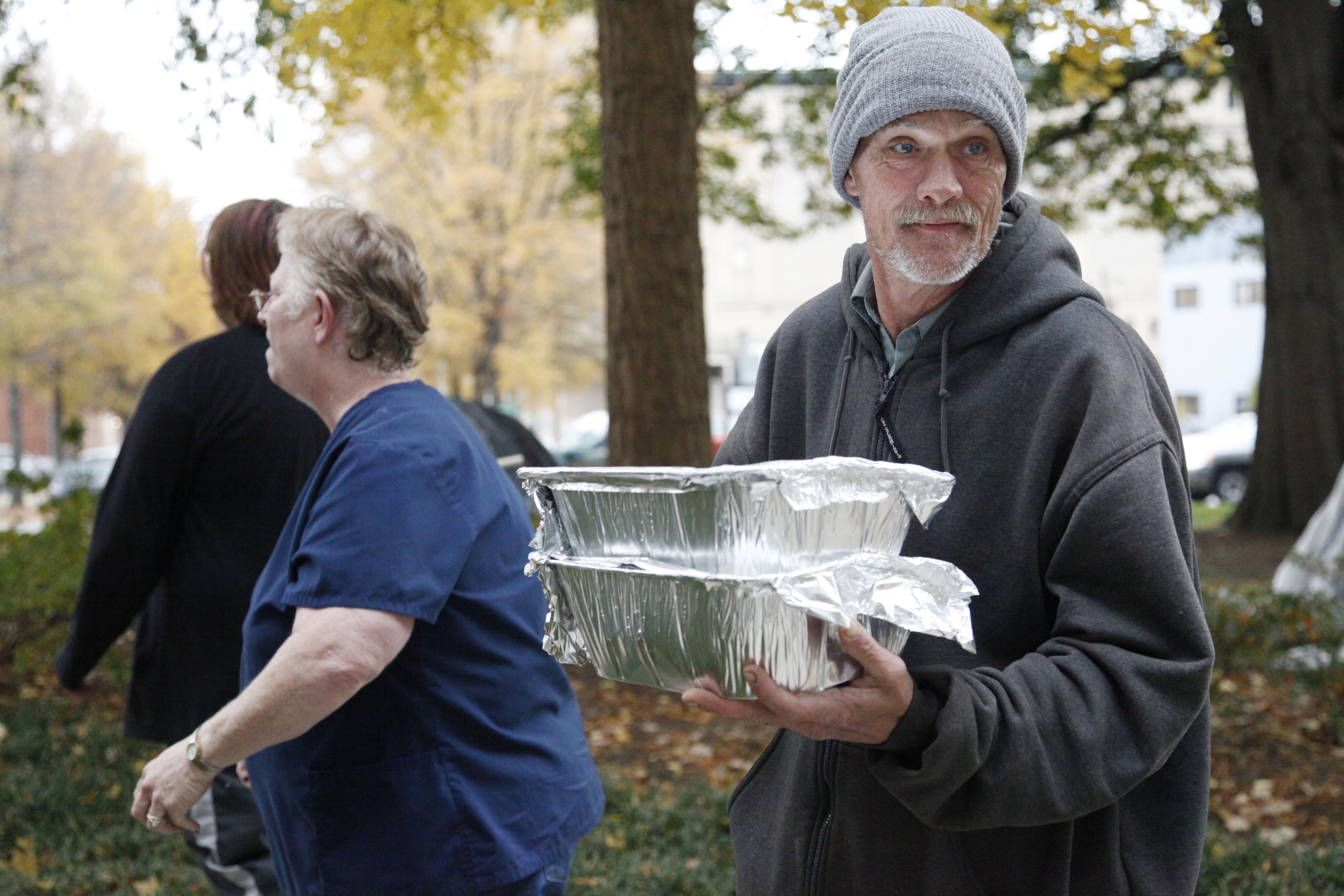Occupy Chattanooga protestors live, sleep and eat together
Sunday, November 13, 2011
On Tuesday, a baker, a college student, a home-schooling mom, a homeless man waiting to hear from a job and a data analyst packed up the supplies they'd gathered for eight days and moved to the Hamilton County Courthouse lawn.
Some of the protesters say they expect to be occupying for a year, maybe more. But as of this morning, they have slept out there for just 12 days, and winter's worst is yet to come.
Occupy Chattanooga has so far avoided the arrests and animosity with police that some Occupy groups in other cities across the nation have experienced.
The local group started with meetings and discussions about issues from universal health care to banking regulations. It held two protest events, one outside a fundraising event for U.S. Rep. Chuck Fleischmann, R-Tenn., and the other in support of living wages, better education and immigration reform.
Now it has become a nonstop protest against - what exactly?
Each protester wants something different, and there are few solutions everyone agrees on. Some want local governments to put tax money in credit unions instead of banks. Some want higher taxes for the rich.
Some protest against corporations, some protest against the government, and some say the line between corporations and government is blurred.
"People over profits, that's as simple as it gets," protester and University of Tennessee at Chattanooga political science student Baris Gursakal said. "Make a profit. You have a right to a profit, but put your employees first. Don't fire them just to make a bigger profit. We aren't against the free market or capitalism because that's what makes this country run."
Regardless of their reasons, the protesters have spent nearly two weeks living together.
At the Hamilton County Courthouse lawn, they have set up more than a dozen sleeping tents, a kitchen and first-aid tent, a library, a garden, and they have a table filled with protest signs.
They cheer as cars honk, and they stop passers-by to explain the protest.
"How are you doing? Greetings," 51-year-old Larry Simpson calls out to a woman in a suit. "Have you heard of Occupy Chattanooga?"
Linda Lawson, a 54-year-old sign-language interpreter, is headed to the Hamilton County Courthouse, and she hasn't heard anything about the local protest.
Simpson hands her a sheet with information about how the richest Americans have caused the economic collapse of the nation, and he tells her that Occupy Chattanooga has meetings every night at 7, and she's more than welcome to come and talk.
"I want the money out of politics," Sela Randazzo, 54, tells Lawson. "Most people say, 'Oh, that'll never happen.' Well, we used to have slavery, and they said that'll never change."
Lawson had to get back to work, but she said she agreed with Simpson and she'd try to make a meeting.
The first night on the City Council building lawn, on Nov. 1, eight people huddled in sleeping bags and struggled to sleep, worrying about arrests and trying to get comfortable. When rain hit later that week, they held tarps on poles over their heads because there was nowhere to put the poles in the ground.
By Thursday, Gursakal said he was getting better at sleeping on the cold ground without a pillow.
Before temperatures hit 29 degrees early Friday morning after they had moved to the Hamilton County Courthouse lawn, a Hamilton County Sheriff's Office deputy told them they could start a fire, as long as it was contained.
The youngest protester is 17 and is limited to protesting after high school. The oldest is 63 and can protest only when she has oxygen tanks available.
The Occupy members set up smoking and nonsmoking sections. They have men's and women's portable toilets. They have barriers to keep people from trampling the flowers at the courthouse.
On a community bulletin board, people list jobs they've heard about.
Simpson, who has been homeless for months, instructed the group on surviving the cold late Thursday night: Put hand warmers inside gloves and socks, wear back warmers, use layers.
Earlier in the week, Simpson discovered that Randazzo worked for a home-care assistance group, and the group was hiring. He said he has 11 years of experience, so Gursakal offered his laptop, and Simpson filled out the application and a 45-minute test. He's still waiting to hear back about the job.
Madi Dillard, a Hixson High School senior whose parents gave her permission to join the group as long as her schoolwork didn't suffer, helps 29-year-old Heidi Davis home-school Davis' 7-year-old daughter. She and Davis taught Ehlana math lessons, using money, and they taught her anatomy in the schoolhouse tent Wednesday.
Davis' husband works full time, but members of her church baby-sit Ehlana when she's not at the camp with her mother. This weekend was the first time Davis, her daughter and her husband, Eric, camped together. Other families brought their children for the weekend, too.
Gursakal and fellow student Rob Hinton keep those who can't make it to the camp updated at www.livestream.com/occupychattanooga/, where wheelchair-bound 63-year-old Debbie McKinney chats as GrannyFromOccupyCHA. Gursakal's computer is powered by car batteries that two electricians hooked up to power supply units, and he and Hinton want to set up 24-hour-a-day live streaming.
On Oct. 7, a month after the Occupy Wall Street protests started in September, Occupy Chattanooga first met with 250 people at Miller Park.
The protests in New York City were originally focused on banking regulations and what protesters believed was financial injustice. In Chattanooga, after the second meeting, one of the protesters who had been involving himself felt that Occupy Chattanooga was becoming a catch-all for everything the members didn't like.
David Ingle, 26, said the group needed to focus on a few demands: re-enacting the banking regulations in the Glass-Steagall Act of 1933, taxing day trading, and regulating banks. Instead, they were talking about abolishing the electoral college and legalizing marijuana, issues he didn't care about.
Because of disagreement over demands, the group decided not to come up with a list until they had a permanent place to camp. They asked the Chattanooga City Council to let them camp at a public park, but the City Council explained that it was illegal.
So that night Davis and Landon Howard, a 29-year-old unemployed social worker, clutched each other's hands, sang "This Little Light of Mine," and camped on the City Council lawn.
They expected to get arrested. Instead, they found out that the City Council lawn wasn't a park, and it was actually legal to camp there.
Over the course of the next eight days, more people joined Davis and Howard, and they added a library, a kitchen, a pantry, a living room, a bulletin board and a vegetable garden.
Tuesday night, they moved to the more spacious Hamilton County Courthouse lawn.
"Look at all this," Gursakal said Tuesday, pointing to the lawn. "Nine days ago, we were four people or eight people in sleeping bags. Now, there's 18 staying here."
 Landon Howard eats vegan lentil soup at the new camp site of Occupy Chattanooga in front of the Hamilton County Courthouse before departing for home on Wednesday morning. Tuesday night Occupy Chattanooga moved from its original camp in front of the Chattanooga City Council building to the courthouse.
Landon Howard eats vegan lentil soup at the new camp site of Occupy Chattanooga in front of the Hamilton County Courthouse before departing for home on Wednesday morning. Tuesday night Occupy Chattanooga moved from its original camp in front of the Chattanooga City Council building to the courthouse.The first night at the courthouse, groups of people gathered around the lawn to talk about how the movement could grow.
Daniel Patterson, a tour guide at the Creative Discovery Museum, asked Howard if he wanted to do yoga in the morning. Howard explained that he was more into meditation than yoga, and he pulled a book called "Essential Tibetan Buddhism" out of the library, using leaves as bookmarks as he quoted passages.
Rickie Blevins, who teaches woodwind and brass instruments for a living, promised to teach the group how to play some of his instruments when he can. Simpson planned to teach the women Tae Bo. The group held a meditation session at 11:11 a.m. on Friday.
"I couldn't bear to walk away from this," Gursakal said. "It would break my heart. I didn't know any of these people nine days ago. Now I know what they think, and we're here together for a common goal."
They've set up a security team, and they enforce a code of conduct. On Tuesday, one protester was banned for cursing and arguing over a pack of cigarettes.
"We're not here to baby-sit people," Simpson said. "We're here to take over the government."
At a general assembly meeting, Randazzo announced that everyone needed to take better care of the group's makeshift portable toilet.
"When you're leaving the bathroom, be mindful," she said. "Is it acceptable for someone else to use?"
The group is preparing to undergo legal observer training to help with any potential conflicts with police.
Blevins said he doesn't see any way that the 24-hour-a-day protest would end before the 2012 elections. Gursakal said he can see the protest lasting for five years or longer.
"If five years from now, things are still the same, [corporations and politicians] are going to have a much bigger problem on their hands," he said. "People aren't just going to give up."




